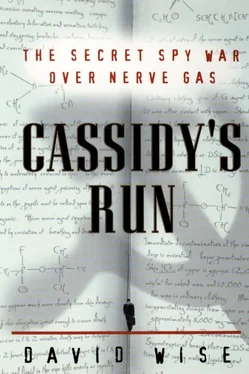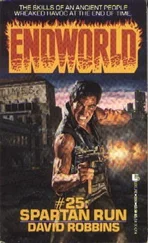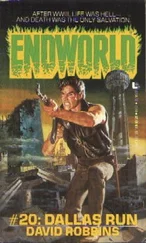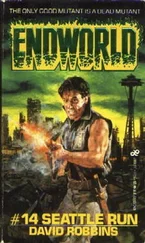In 1964, the KGB attacked Horst Schwirkmann, a wiretap expert for West German intelligence who had been sent to Moscow to debug Bonn’s embassy there. After completing his assignment, Schwirkmann visited the famous Zagorsk Monastery, an hour northeast of Moscow. He stopped to admire a painting of the Resurrection. A middleaged man who had been kneeling and praying by it arose and stood politely behind Schwirkmann, who suddenly felt what seemed like ice water on his left buttock. Within seconds, the West German technician was in agonizing pain, and his skin had blistered. Hospitalized and given intensive medical treatment, he almost lost his left leg but survived. U.S. physicians determined he had been sprayed with deadly nitrogen mustard gas.
Within the KGB’s First Chief Directorate, its foreign-intelligence arm, the assassination unit was first the ninth, then the thirteenth department. In 1965, Peter Deriabin, a KGB defector, testified to a Senate committee, “The thirteenth department is responsible for assassination and terror. This department is called the department of wet affairs, or in Russian Mokrie Dela…. Mokrie means ‘wet,’ and in this case mokrie means ‘blood wet.’”
During the time that Cassidy was working as a double against the Russians, then, the KGB was capable of assassinating its enemies, although it may have later abandoned the practice. In 1989, Victor Gundarev, a KGB colonel who had defected in Greece three years earlier, told the author, “Yes, they had Mokrie Dela. I don’t know a single case in the last fifteen years or more. But there is risk.” Because of the perceived risk, however remote today, most Soviet and Russian defectors in the United States, including Victor Gundarev, live under assumed names in the CIA’s equivalent of the Justice Department’s witness-protection program. [2] The KGB went out of existence after the collapse of the Soviet Union in December 1991. In Russia, the spy organization split into two principal parts: The Russian foreign intelligence service, the old First Chief Directorate, became the Sluzhba Vneshnei Razvedki (SVR), which carries out espionage abroad. The Federal Security Service (FSK, later the FSB) became the successor to the KGB’s internal-security and counterintelligence departments.
The risk was much greater, of course, during the height of the cold war, when Cassidy was instructed to go to Mexico. At the time, the summer Olympic games were under way in Mexico City, and there were no flights or hotel rooms available; the city was completely booked.
Cassidy kissed his bride good-bye but said very little about why he was leaving the country. “Just that it was involved in that work,” Marie remembered.
From Baltimore, Cassidy flew to Dallas, rented a car, and drove to Brownsville, on the Mexican border, hoping to catch a flight from there. He went to a travel agency. “There were no flights to Mexico City, but I was told to keep checking,” Cassidy recalled. “I kept checking for several days and finally decided I would have to drive.”
Having heard stories of bandidos waylaying travelers, Cassidy was not thrilled about the prospect of driving. “The next day the travel agency called and said they had a flight from Matamoros, Mexico, just over the border from Brownsville.” Cassidy turned in the rental car, hailed a cab, took it over the bridge to the dusty, decrepit airport in Matamoros, and caught his flight.
On the plane, Cassidy’s fears crowded in. The FBI’s agents usually watched when he met his Soviet handlers in northern Virginia. Their presence offered a measure of reassurance and protection. But counterintelligence in Mexico might not be possible; the bureau would be operating outside its turf. [3] Although the FBI sometimes conducts surveillances abroad in espionage cases, if it informs the local intelligence service, the risk of a leak increases. If it does not do so, and the foreign government discovers it, there may be unpleasant diplomatic repercussions. Moreover, the CIA is unhappy when the FBI operates in foreign countries, since foreign-intelligence operations are primarily its responsibility.
Yet if Cassidy did not keep the appointment in Mexico City, the Russians might conclude that he was a double agent. Operation SHOCKER could collapse. Cassidy decided he had to go.
Since the hotels in Mexico City were full, the travel agency had made arrangements for Cassidy to stay with a Mexican family. He had several days to kill while waiting for the appointed night. “I spent a week in Mexico posing as an Olympic tourist. I got tickets to boxing, track and field, and swimming.”
Cassidy had arrived early in Mexico City for two reasons. First, he wanted to be sure he got there in plenty of time. “The other reason was a cover story: I went to Mexico to go to the Olympics. That was what I told my family and friends. After all, I had just got married, so why was I flying off to Mexico? I told everybody I already had these arrangements.”
Cassidy was no James Bond, sipping magnums of Dom Pérignon and dining at expensive restaurants with gorgeous women. Having been warned about the water and food, he subsisted on beer, which he did not much like, and peanuts at a downtown bar. Cassidy, who grew up on his grandmother’s mashed potatoes and gravy in Erie, was partial to simple fare; he shunned the tacos and tortillas. His menu expanded a bit when he discovered that the top-floor restaurant of the Hilton hotel had cornflakes. “I was afraid of the milk,” he recalled, “but hell, I was hungry.”
Finally, the night of the meet arrived. Cassidy hailed a cab and took it to what turned out to be a desolate, remote barrio on the outskirts of the city. “The meeting was set for nine P.M. I got there [at] eight-thirty or eight-forty-five. I left the cab and walked to the designated spot in the middle of the block.
“There was nothing there, just several houses built out of wooden boxes. The whole area was a slum. There were shacks across the street and a couple smoking, playing some sort of a game, bent over a board. I could see them by the streetlight.” Looking around, Cassidy realized he was the only American anywhere in the area. “I felt pretty conspicuous, over six feet, with white, close-cropped hair. I don’t know if there was any bureau countersurveillance or whether the CIA was notified. I was hoping the bureau had me under surveillance.”
As he stood there in the dark, Cassidy wondered why Mexico and why he was told not to bring any documents. Did the GRU suspect him? Was he about to be kidnapped?
For the first time since it had all begun almost a decade earlier with volleyball and oyster dinners along the riverfront in Washington, he was frankly scared. “I thought they might put me on a plane to Moscow, give me the truth serum, and shoot me.”
No one stepped out of the shadows at 9 P.M. Cassidy waited for an hour beyond the appointed time, then walked to the corner and waited another half an hour before a taxi came along. The taxi did not stop, but about ten minutes later it cruised by again, and this time it picked him up.
Disappointed but also relieved, Cassidy flew back to Baltimore and reported to the FBI that the Soviets had failed to make contact. At home with Marie, Cassidy made light of his trip at first. He told his wife he had seen some boxing matches and track-and-field events. He joked about his trouble finding something to eat. It was only some time after his return that he revealed to Marie his fears about the trip.
In December, at his next scheduled meeting with his GRU handler, Cassidy complained bitterly. The new “Mike,” to whom Danilin had handed him off, had been identified by the FBI as Oleg Ivanovich Likhachev, a GRU officer listed as a third secretary of the Soviet embassy.
Читать дальше












